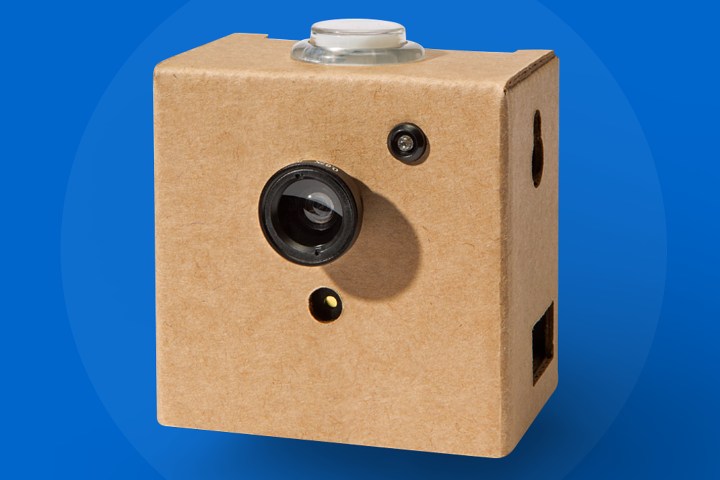
According to Google, the kit includes software supporting three separate neural network models. One model can detect people, cats, and dogs while another specializes in faces and their expressions. The third model is capable of recognizing “a thousand common objects.” You can even train and retrain your own neural network models using a TensorFlow-based tool built into the software.
“We also provide a Python API that gives you the ability to change the RGB button colors, adjust the piezo element sounds and access the four GPIO pins,” Google said.
At the heart of the kit’s design is the $10 Raspberry Pi Zero W board. It’s a self-contained computer consisting of a single-core processor, 512MB of memory, Wireless N and Bluetooth 4.1 connectivity, and several connectors. The kit’s included “VisionBonnet” accessory board packing Intel’s Movidius MA2450 vision processing chip connects to the Raspberry Pi’s CSI camera connector via a flex cable.
The assembly instructions show that these two boards are sandwiched together via the Raspberry Pi’s 40-pin header, and secured in place using plastic standoffs. Meanwhile, the $30 Raspberry Pi Camera 2 plugs into a special slot on the kit’s inner cardboard frame, and then plugs into the CSI camera connector on the VisionBonnet board via a flex cable. Eventually, the base device is enclosed in an additional cardboard shell containing an LED, camera lens, and tripod mount.
Right now, you can pre-order the kit only through Micro Center for $45, but it won’t become available until December 31. The drawback is that Google’s kit does not include the Raspberry Pi Zero W board, the Raspberry Pi Camera 2, or the required blank Micro SD card. Note that this card needs at least 4GB to store the downloadable software required for the device to work, and you’ll also need a utility to install the software onto the card.
Ultimately, the complete image-recognition device for your project will set you back around $85. Add Google’s AIY voice kit, and your project will have the ability to recognize people, animals, objects, and voices. But that’s another $25 just for the kit, which doesn’t include the required $35 Raspberry Pi 3 board, or the SD card needed to store the operating system and voice-recognition software.
So what can you do with image recognition? Google lists a few examples, such as detecting when your dog approaches the back door, sounding an alarm when a sibling creeps into your room, and witnessing the reactions of your neighbors when they view your Griswold-style holiday decorations. The kit sounds like fun if you’re willing to shell out an additional $85 for your project.


